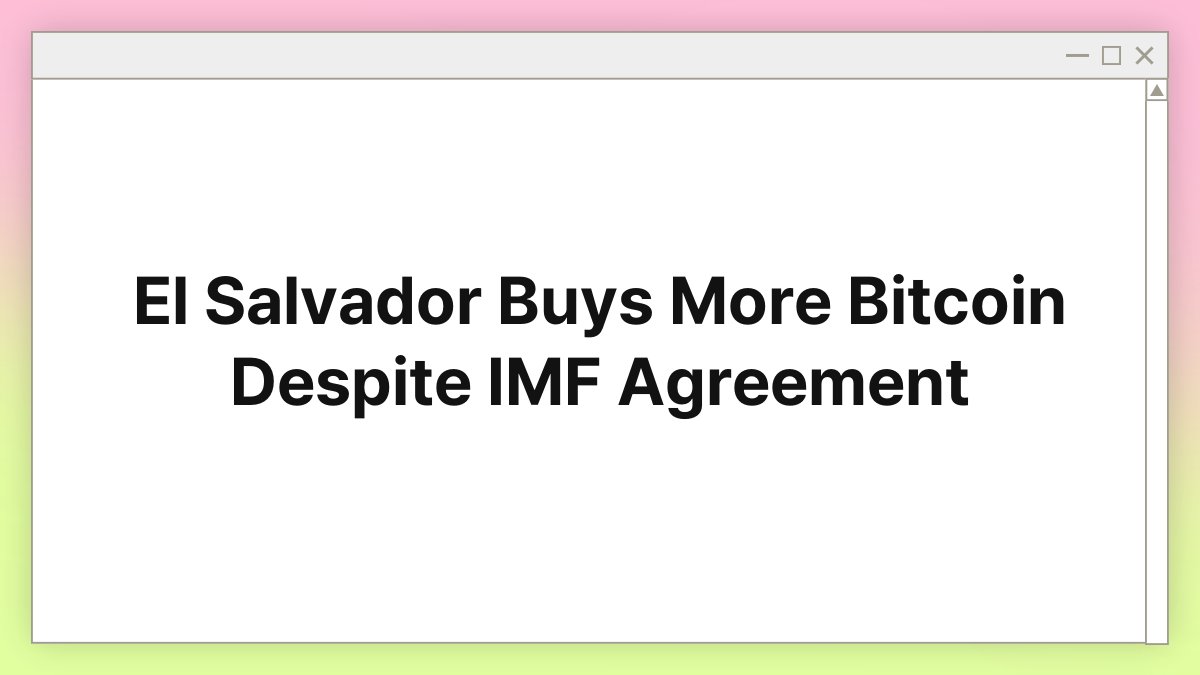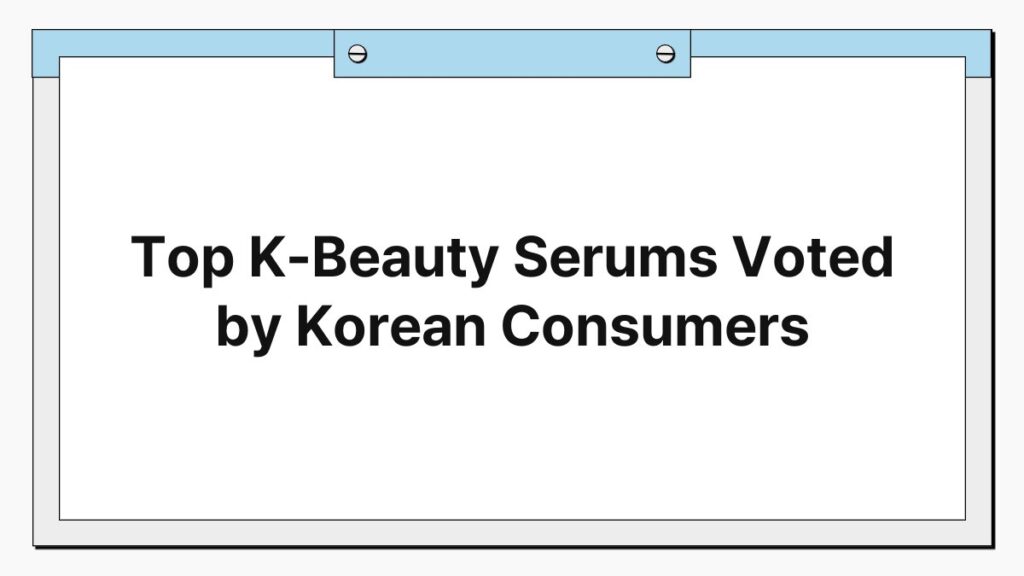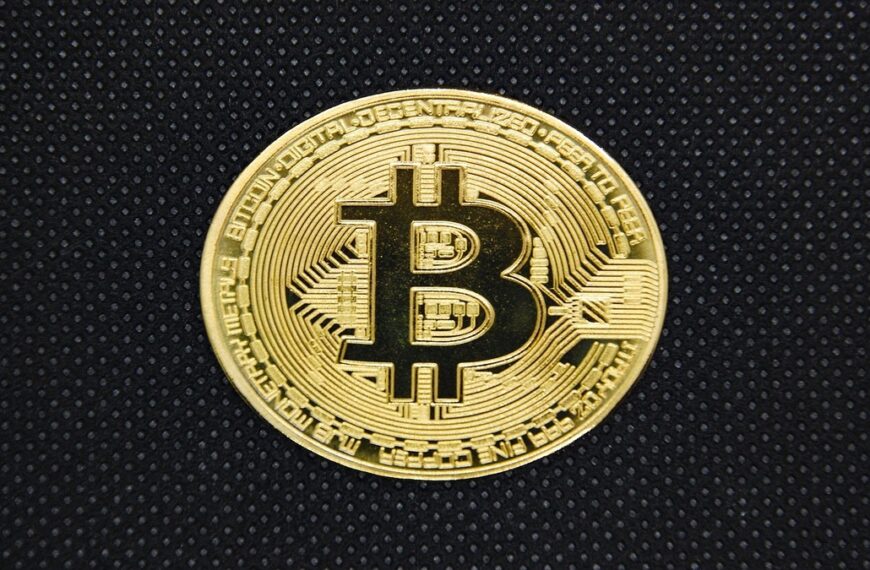[K-Bridge/Jay Son] El Salvador’s recent decision to increase its Bitcoin holdings raises intriguing questions, particularly in light of its ongoing agreement with the International Monetary Fund (IMF).
The country has been a pioneer in adopting cryptocurrency as legal tender, yet its latest actions seem to challenge the IMF’s cautious stance on digital currencies.
This article explores the implications of El Salvador’s Bitcoin purchases, the relationship with the IMF, and what this means for global cryptocurrency markets, particularly in the context of the South Korean market.
As investors and analysts scrutinize these developments, understanding the broader picture becomes essential for making informed decisions in the evolving landscape of digital assets.
El Salvador’s Bitcoin Strategy
A Bold Move in Cryptocurrency Adoption
El Salvador made headlines when it became the first nation to recognize Bitcoin as legal tender in September 2021. This initiative aimed to enhance financial inclusion and attract foreign investment.
However, the recent purchase of additional Bitcoin signals a commitment to this strategy despite external pressures, particularly from the IMF, which has expressed concerns about the risks associated with cryptocurrency adoption.
The government’s approach indicates a belief in Bitcoin’s long-term value and its potential to reshape the economy.
Economic Implications of Increased Holdings
The decision to buy more Bitcoin can be seen as a strategic move to bolster national reserves.
By accumulating Bitcoin, El Salvador aims to leverage the asset’s potential appreciation as a hedge against inflation and economic instability.
This approach could provide a buffer for the country’s economy, particularly in times of financial uncertainty.
As Bitcoin’s value fluctuates, the government’s investments may yield significant returns, potentially enhancing public finances and funding essential services.
Challenges and Risks Ahead
Despite the potential benefits, El Salvador’s aggressive Bitcoin strategy is not without risks.
The volatility of cryptocurrency markets poses a significant threat to economic stability.
A sharp decline in Bitcoin’s value could lead to financial losses for the government, impacting public trust and investor sentiment.
Furthermore, the IMF’s warnings about the dangers of cryptocurrency adoption highlight the need for a balanced approach that considers both the opportunities and challenges presented by digital currencies.
The IMF’s Stance on Cryptocurrency
Concerns Over Financial Stability
The IMF has consistently raised concerns regarding the integration of cryptocurrencies into national economies.
Their primary apprehension revolves around financial stability, as the unpredictable nature of digital assets can undermine traditional banking systems.
The organization has urged countries like El Salvador to exercise caution and consider the potential repercussions of widespread cryptocurrency adoption.
This perspective emphasizes the importance of regulatory frameworks to mitigate risks associated with digital currencies.
The Need for Regulatory Frameworks
For countries embracing cryptocurrencies, establishing robust regulatory frameworks is crucial.
The IMF advocates for regulations that ensure consumer protection, prevent money laundering, and promote financial integrity.
As El Salvador continues to expand its Bitcoin holdings, the necessity for clear guidelines becomes paramount.
A well-defined regulatory environment can foster investor confidence and facilitate the sustainable growth of the cryptocurrency market.
Potential for Future Collaboration
Despite its concerns, the IMF recognizes the potential benefits of digital currencies.
Future collaboration between El Salvador and the IMF could lead to a more balanced approach to cryptocurrency adoption.
This partnership may involve developing guidelines that allow for innovation while safeguarding financial stability.
Such collaboration could set a precedent for other nations considering similar paths, providing a framework for responsible cryptocurrency integration.
Global Market Reactions
Impact on Bitcoin’s Price Dynamics
El Salvador’s ongoing investment in Bitcoin has implications for the global cryptocurrency market.
As a national entity actively purchasing Bitcoin, El Salvador contributes to increased demand, which can influence price dynamics.
The perception of Bitcoin as a legitimate asset class may strengthen, attracting further institutional investment.
This trend could lead to heightened volatility but also potential price appreciation as more entities recognize Bitcoin’s value.
Comparisons with Other Nations
El Salvador’s approach to Bitcoin contrasts sharply with the policies of other nations.
While some countries have embraced cryptocurrencies, others remain skeptical, imposing strict regulations.
This divergence creates a complex landscape where investors must navigate varying levels of acceptance and regulatory scrutiny.
Observing how different countries respond to cryptocurrency adoption can provide valuable insights for investors looking to diversify their portfolios.
Insights for South Korean Investors
For South Korean investors, El Salvador’s actions present both opportunities and challenges.
As the Korean market continues to evolve, understanding the implications of global trends becomes essential.
The government’s stance on cryptocurrencies and potential regulatory changes may influence local market dynamics.
Investors should remain vigilant and consider how international developments, such as El Salvador’s Bitcoin purchases, could impact their investment strategies.
The South Korean Cryptocurrency Landscape
Regulatory Developments in South Korea
South Korea has been proactive in establishing regulations surrounding cryptocurrencies.
Recent measures aim to create a safer trading environment while promoting innovation.
The government’s approach reflects a desire to balance the potential benefits of digital currencies with the need for consumer protection.
As El Salvador navigates its relationship with the IMF, South Korea’s regulatory framework could serve as a reference point for balancing innovation and stability.
Market Sentiment and Investor Behavior
The South Korean cryptocurrency market is characterized by high volatility and investor enthusiasm.
El Salvador’s Bitcoin strategy may influence local sentiment, prompting investors to reassess their positions in digital assets.
As news of El Salvador’s purchases circulates, market reactions could lead to fluctuations in trading volumes and prices.
Investors should monitor these developments closely, as shifts in sentiment can create both opportunities and risks.
Future Trends in Cryptocurrency Adoption
Looking ahead, the trajectory of cryptocurrency adoption in South Korea will likely be influenced by global trends.
As countries like El Salvador take bold steps toward integrating Bitcoin into their economies, South Korea may need to adapt its strategies accordingly.
The interplay between domestic regulations and international developments will shape the future of the cryptocurrency landscape, requiring investors to stay informed and agile.
Investment Strategies in a Changing Landscape
Diversifying Cryptocurrency Portfolios
In light of recent developments, diversifying cryptocurrency portfolios becomes increasingly important.
Investors should consider a mix of established cryptocurrencies like Bitcoin and emerging altcoins to mitigate risks.
By spreading investments across various assets, investors can better navigate market volatility and capitalize on growth opportunities.
This strategy aligns with the evolving nature of cryptocurrency markets, where new projects and technologies continuously emerge.
Long-Term vs.
Short-Term Investments
Investors must also determine their investment horizons.
Long-term strategies may involve holding Bitcoin and other cryptocurrencies through market fluctuations, capitalizing on potential appreciation over time.
In contrast, short-term trading strategies may focus on exploiting price volatility for quick gains.
Each approach carries its own risks and rewards, necessitating careful consideration of market conditions and personal investment goals.
Staying Informed on Market Trends
Remaining informed about market trends and regulatory changes is essential for successful investing.
As El Salvador’s actions unfold, investors should monitor how these developments impact global cryptocurrency markets.
Engaging with reputable news sources, participating in discussions, and leveraging analytical tools can provide valuable insights.
In a rapidly changing landscape, knowledge becomes a critical asset for making informed investment decisions.
Conclusion: Navigating the Future of Cryptocurrency
El Salvador’s decision to increase its Bitcoin holdings amidst its agreement with the IMF highlights the complexities of cryptocurrency adoption.
As the nation pioneers a bold approach, the implications extend beyond its borders, influencing global markets and investor sentiment.
For South Korean investors, understanding these dynamics is crucial for navigating the evolving landscape of digital assets.
By staying informed and adapting strategies, investors can position themselves to capitalize on the opportunities presented by this transformative era in finance.
As the cryptocurrency market continues to evolve, the interplay between innovation, regulation, and market sentiment will shape the future of digital currencies.







